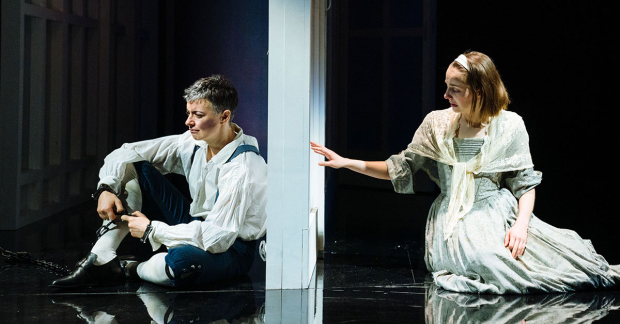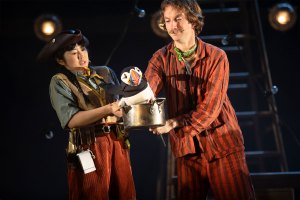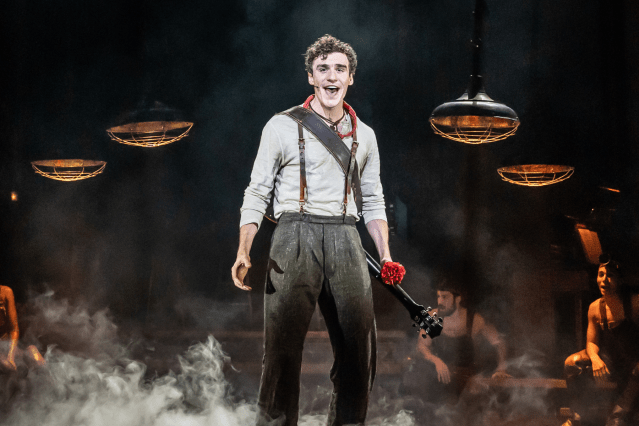”Linck and Mülhahn” at the Hampstead Theatre – review

© Helen Murray
There’s a bitter irony to the fact than less than three months after the announcement that its entire Arts Council funding was to be withdrawn, Hampstead Theatre, whose raison d’être is to showcase new writing, is producing one of the best new plays in years. Ruby Thomas’s ambitious, drop-dead gorgeous piece roars onto the venue’s main stage under Owen Horsley’s glorious direction with a rare swagger and brio, full of non-binary joy and defiance, anachronisms, scintillating wit, swashbuckling action, and ultimately a hugely satisfying emotional wallop.
Like it’s two principal characters, Linck and Mülhahn eludes pigeon holing. It’s a historical pageant, a memory play, a rollicking adventure, a tender love story, a comedy of manners, a courtroom drama, and it slides assuredly and seamlessly between those disparate genres before ending in a beautiful, queer “what if” moment that provokes sighs of approval and a few tears.
Inspired by the transcript of an actual court case in 1700s Prussia where army deserter Anastasius Linck (born Catharina Margaretha) stood trial alongside their wife, also named Catharina Margaretha in a case of truth being more remarkable than fiction, for unlawful sexual activity, despite Anastasius having lived as a male since childhood. It’s a fascinating history lesson, albeit one shot through with a surprisingly high quota of humour as Thomas depicts the contrast between Anastasius’ free-wheeling escapades as a young military man, and the free-spirited Catharina’s attempts to resist efforts by her pushy, outspoken mother (Lucy Black in magnificent scenery-chomping form) to marry her off to the highest bidder. When the pair meet, the verbal sparring, mutual intellectual stimulation and underlying attraction rather recalls Congreve’s Mirabell and Millamant, and Thomas has given them dialogue that similarly sparkles and shimmers. The intrigue is upped by Catharina’s mother investigating the mysterious background of her new son-in-law, and the first half ends on a real cliffhanger.
Most of act two is taken up with the joint trial, which proves as absurd as it is sinister, as a trio of blustering men, led by Kammy Darweish’s hilariously pompous judge, struggle, and fail, to comprehend a relationship that lies outside their immediate experience. It’s bleakly funny and thought-provoking, as recriminations fly, and unexpected allegiances reveal themselves, but not enough to save Anastasius from execution (tellingly, by the sword, as a man, whereas if they had been convicted as a woman, same-sex intimacy carried the penalty of death by burning at the stake). The basic story is fairly simple but director Horsley paints it with bold, vibrant theatrical strokes. Furthermore, the timeless yet contemporarily urgent subjects of gender identity and the importance of living the most authentic life possible are given due weight and complexity in Thomas’s cracking script.
At a time where, lamentably, transgender people are still significantly more likely to be murdered just for being who they are than their cis cousins, objections have understandably been raised as to whether it was appropriate to be telling a story which culminates in the early death of a non-binary person. However, this is based on a real life case, and, in Maggie Bain’s stupendous performance, Linck is no traditional victim. They are charming, steely and admirable, and watching Bain flourish from laddish loner to the realisation that a lifetime could be spent with another human is a genuine possibility, is deeply moving. See it, and you’ll never forget their final speech before execution, delivered atop Simon Wells’s perpetually revolving set, with a riveting combination of passion, defiance and carefully controlled white hot fury: “I do not believe I have committed an offence by my existence. I only wish I had lived it louder… we have always existed. We will always exist. Whether people accept us or no, it makes no odds. It merely determines how much we are made to suffer.” The combination of intent, writing and performance in that moment is a thing of authentic power, and the crown on an exceedingly rich and rewarding piece of theatre.
The casting of the magnificent Bain, an openly non-binary actor, as Linck is one of many things that Horsley’s production gets absolutely right. Equally astonishing is Helena Wilson’s Catharina Mülhahn, a gloriously eccentric, hugely likeable young woman, free-thinking, impassioned, fiercely intelligent and occasionally totally outrageous. Wilson invests her with a winning warmth and magnetism, but also a sensitivity that gently takes the breath away. The connection between these unconventional, beautiful souls entirely convinces and provides a still, true centre to this rambunctiously entertaining show. There’s lovely work too from Marty Cruickshank as the older Catharina looking back in pained reminiscence, Qasim Mahmood as Linck’s military sidekick who knows more than he lets on, and Leigh Quinn, hysterically funny as a gormless family servant on the make.
This is one of those rare life-enhancing evenings that provokes, moves and educates as much as it entertains, but always feels like an exciting piece of theatre, never a lecture. It’s a great piece of storytelling: profoundly moving and wildly funny, delicate yet tough, it’s part of a real human journey that is still going on. A triumph.
















